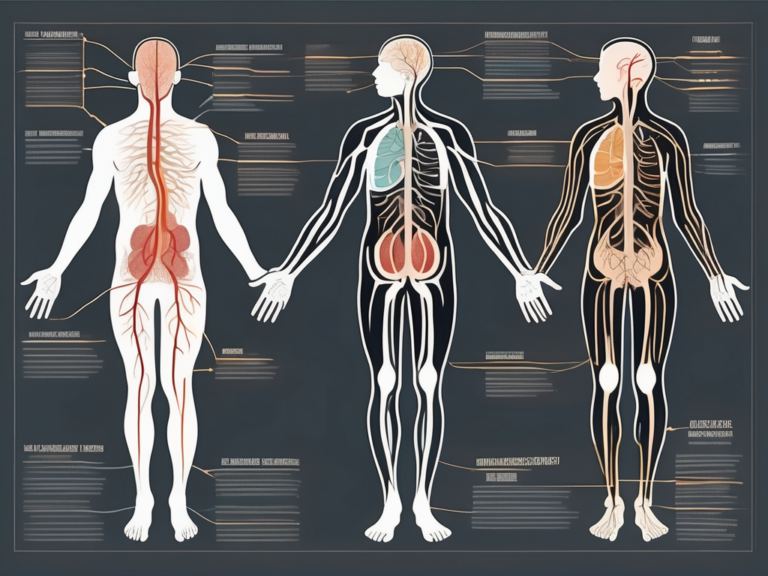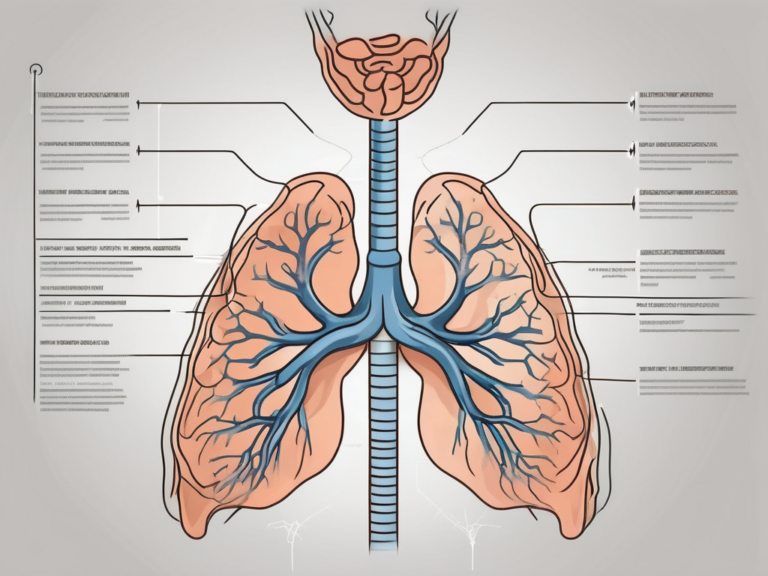The Importance of the Auricular Nerve
The auricular nerve, an often overlooked component of the human nervous system, plays a crucial role in sensory perception and overall neurological health. Understanding the anatomy, function, and medical relevance of this nerve is essential for healthcare professionals and researchers alike.
Understanding the Auricular Nerve: An Overview
Before delving into the intricate details of the auricular nerve, it is crucial to establish a foundational understanding of its overall significance. This nerve is a branch of the facial nerve, also known as the seventh cranial nerve. The auricular nerve branches out behind the ear, supplying sensory innervation to various parts of the ear and surrounding regions.
The auricular nerve plays a vital role in the intricate network of nerves that govern the functions of the ear. It is responsible for not only transmitting sensory information but also coordinating motor functions that contribute to the overall health and functionality of the ear.
Anatomy of the Auricular Nerve
The auricular nerve is composed of both sensory and motor fibers. The sensory fibers originate from the geniculate ganglion, while the motor fibers arise from the facial nerve in the temporal bone. The sensory distribution of the auricular nerve extends to the external acoustic meatus, posterior auricle, and external surface of the tympanic membrane. Meanwhile, the motor fibers provide innervation to the auricular muscles, specifically the posterior auricular muscle.
Furthermore, the auricular nerve is intricately connected to other nerves in the region, forming a complex neural network that enables the ear to function effectively. This network allows for the coordination of various sensory and motor functions, ensuring that the ear can respond appropriately to different stimuli and maintain its structural integrity.
Function of the Auricular Nerve
The primary function of the auricular nerve lies in the transmission of sensory information from the external ear to the brain. This involves relaying signals related to sound, as well as environmental factors such as temperature and touch. Additionally, the motor fibers of the auricular nerve are responsible for controlling certain movements of the ear, though these are limited in comparison to the sensory aspects.
Overall, the auricular nerve serves as a crucial link between the external environment and the brain, allowing for the perception and interpretation of various stimuli. Its role in both sensory and motor functions highlights its importance in maintaining the health and functionality of the ear.
The Auricular Nerve’s Role in Sensory Perception
The auricular nerve’s sensory contributions to hearing and spatial orientation warrant further exploration. By understanding its connections to the ear and its impact on balance, healthcare professionals can better comprehend the implications of auricular nerve dysfunction.
The auricular nerve, a branch of the vagus nerve, is a crucial component of the sensory system responsible for transmitting information from the ear to the brain. This intricate network of nerve fibers not only facilitates the perception of sound but also aids in the body’s ability to maintain equilibrium and spatial awareness.
Connection to the Ear and Hearing
The auricular nerve’s innervation of the external acoustic meatus and the external surface of the tympanic membrane allows it to contribute to the sense of hearing. It assists in detecting sound waves and transmitting auditory signals to the brain for processing and interpretation. Any disruption or dysfunction in the auricular nerve’s sensory function can adversely affect hearing capabilities and lead to various auditory disorders.
Furthermore, the auricular nerve’s role in hearing extends beyond the physical reception of sound. It is intricately involved in the brain’s ability to localize the source of a sound, allowing individuals to determine the direction and distance of auditory stimuli. This localization ability is essential for situational awareness and safety in various environments.
Impact on Balance and Spatial Orientation
In addition to hearing, the auricular nerve also plays a vital role in maintaining balance and spatial orientation. Through its connections with the vestibulocochlear nerve, which is responsible for balance and proprioception, the auricular nerve helps the brain perceive spatial cues and maintain equilibrium. Consequently, damage or dysfunction of the auricular nerve can result in disturbances in balance and spatial awareness, causing dizziness and instability.
Moreover, the auricular nerve’s intricate interplay with the vestibular system, which includes the semicircular canals and otolith organs in the inner ear, is essential for coordinating movements and posture. This integration of sensory information from the auricular nerve with vestibular input allows individuals to navigate their surroundings with precision and stability, highlighting the multifaceted role of this nerve in sensory perception and motor coordination.
The Auricular Nerve in Medical Science
From a medical perspective, understanding the disorders associated with the auricular nerve and the diagnostic procedures used in evaluating its functionality is crucial for accurate diagnosis and appropriate management. The auricular nerve, a branch of the vagus nerve, plays a vital role in transmitting sensory information from the ear to the brain, contributing to functions such as hearing and balance.
Healthcare professionals specializing in otolaryngology and neurology often encounter patients presenting with symptoms related to auricular nerve dysfunction. By delving into the complexities of this nerve and its associated disorders, medical practitioners can offer targeted treatment plans to alleviate patients’ discomfort and improve their quality of life.
Disorders Associated with the Auricular Nerve
Various disorders can affect the auricular nerve, leading to sensory disturbances, hearing impairment, and balance issues. Examples include neuralgia, wherein patients experience sharp, shooting pain in the ear or its surrounding regions, and peripheral vestibular disorders, which can cause vertigo and unsteadiness. Additionally, trauma to the nerves or certain infections can also result in auricular nerve dysfunction. Understanding the underlying causes of these disorders is essential in providing personalized care and effective management strategies tailored to each patient’s unique needs.
Furthermore, research continues to explore the intricate connections between the auricular nerve and other cranial nerves, shedding light on how disruptions in this network can manifest in a variety of symptoms beyond traditional auditory and vestibular disturbances.
Diagnostic Procedures Involving the Auricular Nerve
To diagnose auricular nerve disorders accurately, healthcare professionals may employ various diagnostic procedures. These can include audiometry tests to assess hearing capabilities, electronystagmography to evaluate balance function, and magnetic resonance imaging (MRI) scans to visualize the nerve and surrounding structures. These diagnostic measures allow for a comprehensive assessment of the auricular nerve’s role in the patient’s symptoms. Additionally, emerging technologies such as high-resolution imaging and nerve conduction studies offer new insights into the functioning of the auricular nerve, enabling more precise diagnoses and targeted interventions.
Treatment and Management of Auricular Nerve Conditions
When faced with auricular nerve-related disorders, a multidisciplinary approach is often necessary to provide optimal care. Non-surgical interventions are typically the first line of treatment, although surgical procedures and innovative techniques may be required in more complicated cases.
Understanding the intricate network of nerves surrounding the ear is crucial in diagnosing and treating auricular nerve conditions. The auricular nerve system is a complex web of sensory and motor nerves responsible for various functions, including sensation, movement, and balance. Dysfunction in this system can manifest in symptoms such as pain, numbness, tingling, and even motor deficits.
Non-Surgical Interventions
Non-surgical interventions for auricular nerve disorders primarily focus on symptom management and improving quality of life. This can include medications to alleviate pain and inflammation, physical therapy exercises to enhance balance and coordination, and assistive devices such as hearing aids to improve auditory function. Additionally, lifestyle modifications and counseling can play a significant role in supporting patients in coping with the psychological impact of their condition.
Furthermore, alternative therapies like acupuncture, chiropractic care, and biofeedback techniques have shown promise in complementing traditional treatments for auricular nerve disorders. These holistic approaches aim to address the body’s natural healing mechanisms and promote overall well-being, offering patients additional options for managing their symptoms.
Surgical Procedures and Innovations
In cases where non-surgical interventions prove ineffective or if there is underlying anatomical abnormalities or nerve compression, surgical options may be considered. Surgical techniques can range from nerve decompression procedures to restore proper nerve function to nerve grafting or neuromodulation techniques. It is essential to collaborate with a specialized surgeon to determine the most suitable treatment approach for each patient’s unique situation.
Advancements in surgical technology, such as the use of robotic-assisted procedures and minimally invasive techniques, have revolutionized the field of auricular nerve disorder management. These cutting-edge innovations offer improved precision, reduced recovery times, and enhanced outcomes for patients undergoing surgical intervention. By staying abreast of the latest developments in surgical care, healthcare providers can ensure that individuals with auricular nerve conditions receive the most effective and personalized treatment available.
The Future of Auricular Nerve Research
As medical science continues to advance, ongoing research into the auricular nerve holds the promise of expanding our knowledge of its function and potential applications. Emerging studies and discoveries provide valuable insights into the auricular nerve’s role and potential implications for overall neurological health.
Emerging Studies and Discoveries
Current research endeavors are shedding light on previously undiscovered aspects of the auricular nerve, including its role in neuroplasticity and neural modulation. Researchers are exploring how various interventions, such as electrical stimulation and acupuncture, may harness the auricular nerve’s potential to promote healing and modulate neurological responses. These exciting findings open new avenues for innovative treatments and therapeutic approaches.
Potential Implications for Neurological Health
The implications of auricular nerve research extend beyond its immediate applications. Enhancing our understanding of the auricular nerve’s intricate connections may provide valuable insights into the broader mechanisms underlying neurological health and disease. By uncovering the nuances of this peripheral nerve, researchers may uncover novel strategies for managing and treating a range of neurological conditions.
Bringing Attention to a Vital Component of the Nervous System
The auricular nerve, often overlooked in comparison to more prominent nerves, plays a critical role in sensory perception and neurological health. Its intricate anatomy, vital functions, and medical implications highlight the importance of understanding and appreciating this component of the nervous system. Through continued research and clinical progress, healthcare professionals can strive towards providing optimal care for patients with auricular nerve-related disorders and contribute to advancements in the field of neurology as a whole.






